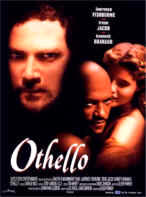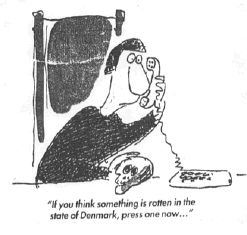Graduate Shakespeare Seminar (6233)

First
Summer
Term, 2003: 9:50-11:30 a.m.
Dr.
Wayne
Narey
The graduate seminar in Shakespeare this summer offers a
unique experience for students. Rather
than the usual survey course, our focus will be on Shakespeare's middle-period
tragedies, the so-called "Great Tragedies": Hamlet, Othello,
King Lear, and Macbeth. In
addition to the concentration of study that these works deserve, the class will
focus on performance; that is, we'll discuss staging techniques, Elizabethan
acting styles, stage movement and grouping, and add stage history and film
adaptation to better understand the exceptional nature of an exciting dramatic
experience, where the audience was as much a part of the action as the actors
themselves.
Collectively,
these plays represent the finest achievements of the amazingly rich corpus of
dramatic literature during the Elizabethan era.
In our study this summer, we'll come to appreciate why in a number of
rich and diverse ways that would otherwise be impossible in a larger format with
more works to consider.
Because of our specialized focus, we'll also spend more
time on the beauty of the language as a vehicle for understanding the actor's
role, noting the many ways in which the directorial signals are intricately
woven within the fabric of the poetry. We'll
study how the exhausting repertory schedule, coupled with the brevity of
rehearsal time, led to an ensemble group of actors who took direction from the
text (they only had copies of their own roles from which to memorize) and their
own instincts (as they heard the other actors' lines for the first time).
Since
performance will be our focus, film will also play an integral part in our
study, as we compare a number of famous productions and contrast as well the
interpretations of individual scenes. The
seminar will afford us the opportunity to share those
 experiences
in a more intimate setting. And in
lieu of some of the usual requirements, students will serve as knowledgeable
audience, contributing their own experiences and critique of film adaptations.
We'll blend scholarship, Elizabethan theatrical practices, and fun in an
endeavor to understand the lasting power of these plays and the vibrancy they
still hold after nearly four-hundred years.
experiences
in a more intimate setting. And in
lieu of some of the usual requirements, students will serve as knowledgeable
audience, contributing their own experiences and critique of film adaptations.
We'll blend scholarship, Elizabethan theatrical practices, and fun in an
endeavor to understand the lasting power of these plays and the vibrancy they
still hold after nearly four-hundred years.
